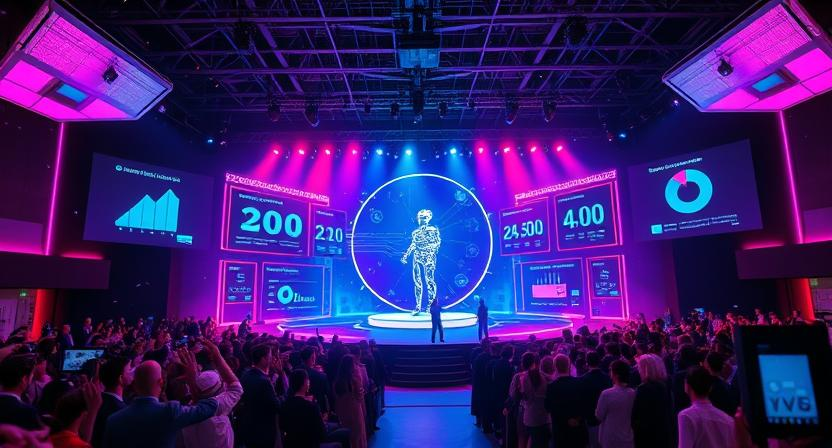
How AI Improves Marketing Compliance and Risk Management
March 26, 2025
AI-Driven Storytelling: Crafting Narratives with Data
March 27, 2025Artificial Intelligence (AI) is transforming the way businesses plan and execute product launch campaigns. Traditional product launches relied heavily on manual research, intuition-based marketing strategies, and static content creation. However, with AI-driven tools, companies can now analyze vast amounts of data, personalize their marketing efforts, and optimize their campaigns in real-time. AI not only enhances efficiency but also improves accuracy in predicting consumer behavior, ensuring higher engagement and better returns on investment. From market research to automated customer engagement, AI plays a crucial role in every stage of a product launch campaign. In this article, we will explore how AI is revolutionizing product launches and why companies must integrate AI into their marketing strategies to stay ahead of the competition.

Understanding AI in Marketing
AI in marketing refers to the use of machine learning algorithms, natural language processing, and predictive analytics to improve various aspects of digital marketing. AI helps marketers automate repetitive tasks, analyze customer behavior, and enhance decision-making processes. For instance, AI-powered platforms like Google Ads and Facebook Ads use sophisticated algorithms to optimize ad targeting, ensuring that advertisements reach the most relevant audiences. Additionally, AI-driven chatbots assist in customer service, responding to inquiries instantly and providing personalized recommendations. By leveraging AI, businesses can create highly efficient marketing campaigns that adapt in real-time to consumer trends, thereby increasing the success rate of product launches.

AI in Market Research & Consumer Insights
Market research is a critical phase of any product launch, as it helps companies understand their target audience and competitors. AI has revolutionized this process by offering advanced data analytics tools that can analyze millions of data points in seconds. AI-powered sentiment analysis tools, such as Brandwatch and IBM Watson, scan social media, customer reviews, and online forums to determine how people feel about certain products or brands. This enables companies to gain real-time insights into consumer preferences, identify emerging market trends, and tailor their product launches accordingly. Additionally, AI can track competitor strategies, providing businesses with a comprehensive view of the market landscape. Instead of relying on traditional surveys and focus groups, companies can now use AI-driven tools to collect accurate, unbiased, and large-scale consumer insights, ensuring a more data-driven approach to product launches.

Personalization & Targeted Advertising
Personalization has become a key factor in modern marketing, as consumers expect tailored experiences. AI enables businesses to deliver personalized content by analyzing user behavior, browsing history, and purchase patterns. AI-driven recommendation engines, such as those used by Netflix and Amazon, suggest products and content based on individual preferences. In advertising, AI plays a crucial role in programmatic advertising, where machine learning algorithms automatically purchase ad space and optimize bidding strategies in real-time. This ensures that ads are displayed to the most relevant audience, maximizing engagement and conversion rates. Furthermore, AI-powered chatbots enhance personalization by providing instant responses and product recommendations based on customer queries. By leveraging AI for targeted advertising, companies can significantly improve the effectiveness of their marketing campaigns and boost sales.

AI-Generated Content & Automation
Content creation is a time-consuming process, but AI has made it easier by automating various aspects of content generation. AI-powered tools like Jasper and Copy.ai can create high-quality blog posts, social media updates, and ad copies in seconds. Additionally, AI-driven video generation platforms, such as Synthesia and Lumen5, help businesses create engaging promotional videos without the need for expensive production teams. AI can also automate email marketing campaigns by analyzing user interactions and sending personalized emails at optimal times. This level of automation allows businesses to focus on strategic planning while AI handles the repetitive tasks, ensuring consistency and efficiency in content marketing. AI-generated content not only saves time but also enhances engagement by delivering hyper-relevant messages to the audience.

AI in Influencer & Brand Partnerships
Influencer marketing has become a powerful strategy for product launches, but identifying the right influencers can be challenging. AI-powered platforms like Upfluence and AspireIQ use machine learning algorithms to analyze influencer engagement, audience demographics, and content authenticity. This helps brands select the most suitable influencers for their campaigns. Additionally, AI tools measure influencer performance by tracking key metrics such as engagement rates, click-through rates, and conversion rates. AI-driven predictive analytics can also forecast the success of influencer collaborations, allowing companies to make data-driven decisions. By integrating AI into influencer marketing, businesses can maximize their ROI and ensure that their product launches reach the right audience through trusted voices.

AI-Powered Product Positioning & Pricing Strategies
Determining the right positioning and pricing for a new product is critical to its success. AI helps businesses analyze market trends, competitor pricing, and consumer purchasing behaviors to optimize their pricing strategies. Dynamic pricing models powered by AI adjust prices in real-time based on demand, competition, and other external factors. For example, airlines and e-commerce platforms use AI-driven pricing algorithms to offer competitive pricing to customers. AI also assists in A/B testing, where different marketing strategies are tested simultaneously to determine the most effective approach. This ensures that companies position their products optimally and maximize profitability.

AI in Customer Engagement & Support
Customer engagement is a vital aspect of a product launch campaign, and AI-driven chatbots and virtual assistants have significantly improved this area. AI chatbots, such as those powered by ChatGPT and Drift, provide instant responses to customer inquiries, improving user experience and reducing wait times. These AI assistants can handle multiple customer interactions simultaneously, ensuring efficient support during high-traffic periods. Moreover, AI-powered sentiment analysis tools track customer feedback and complaints in real-time, allowing businesses to address concerns proactively. By using AI to enhance customer engagement, companies can build stronger relationships with their audience and increase customer satisfaction.

Predictive Analytics & Performance Tracking
AI-powered predictive analytics tools help businesses forecast the success of their product launches by analyzing historical data, customer behavior, and market trends. AI-driven dashboards provide real-time insights into campaign performance, enabling marketers to make data-driven decisions. By continuously tracking key performance indicators (KPIs), businesses can identify areas that need improvement and optimize their strategies accordingly. AI tools like Google Analytics and HubSpot provide in-depth reports on customer interactions, helping companies refine their marketing approaches. The ability to predict future trends and adjust campaigns in real-time ensures better results and higher conversion rates.

AI-Driven Sales Forecasting & Demand Prediction
AI plays a crucial role in sales forecasting by analyzing historical data and predicting future demand. AI-powered tools use machine learning algorithms to assess factors such as seasonality, market trends, and customer preferences. This helps businesses optimize inventory management and reduce the risk of overproduction or stock shortages. AI-driven demand prediction models also assist in supply chain management, ensuring that products are available when and where they are needed. Companies that leverage AI for sales forecasting gain a competitive advantage by making informed decisions and minimizing operational risks.

Ethical Considerations & AI Challenges
While AI offers numerous benefits, it also presents ethical challenges that businesses must address. AI algorithms can sometimes exhibit biases if trained on biased data, leading to unfair marketing practices. Privacy concerns also arise when AI collects and processes customer data. Companies must ensure transparency and comply with data protection regulations such as GDPR and CCPA. Additionally, AI should be used responsibly to maintain consumer trust. By implementing ethical AI practices, businesses can maximize the benefits of AI while minimizing potential risks.
Conclusion
AI has revolutionized product launch campaigns by enhancing efficiency, personalization, and decision-making. From market research to predictive analytics, AI-powered tools enable businesses to execute data-driven strategies that maximize engagement and conversion rates. As AI technology continues to evolve, its role in marketing will only become more prominent. Companies that embrace AI-driven solutions will gain a competitive edge and ensure the success of their product launches. By integrating AI into their marketing strategies, businesses can create more impactful campaigns and achieve sustainable growth in the digital age.


